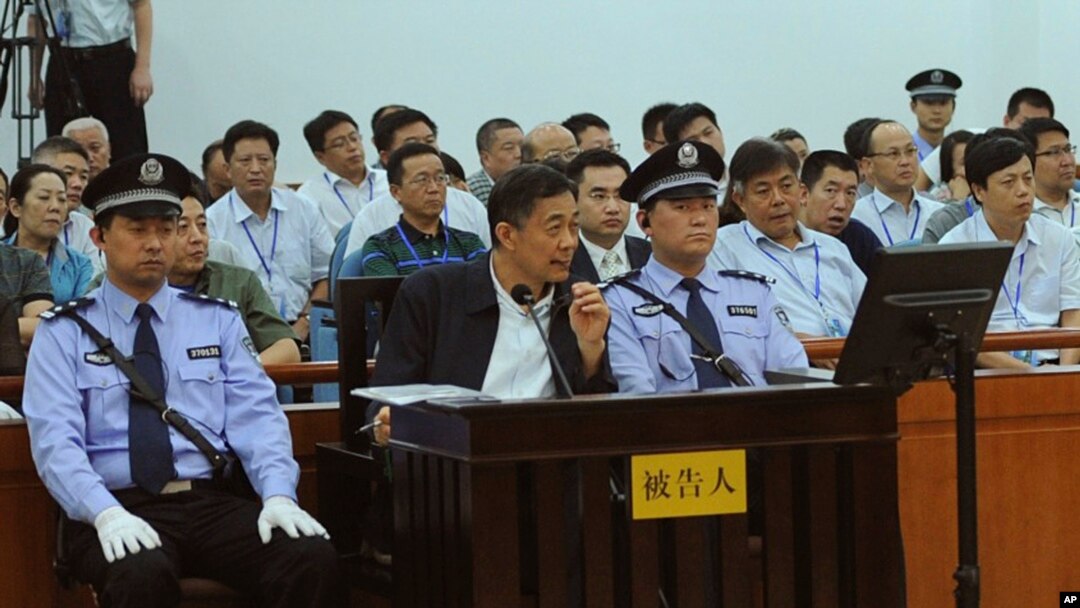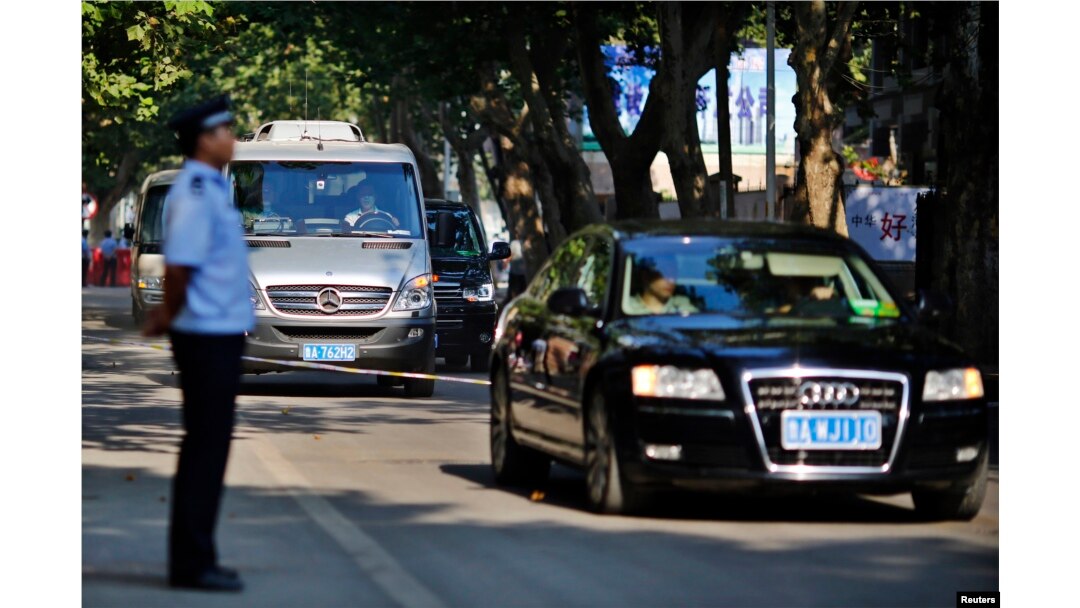BEIJING —
Chinese politician Bo Xilai denied allegations he abused his power and blocked an investigation into his wife’s murder of British businessman Neil Heywood. His fierce defense against these and other allegations came during Saturday's court sesson. The trial moves into a fourth day Sunday.
Bo Xilai faced his former subordinate, Chongching police chief Wang Lijun. Wang helped expose the murder of Neil Heywood, a scandal that ended Bo’s political career.
Bo told Saturday's hearing Wang had confronted him about Gu Kailai’s murder of Heywood and that he slapped the police chief in response. He relieved Wang from his post several days later due to work-related stress.
Bo said his wife convinced him at the time that she had not killed (Heywood). Bo said Gu believed the police chief was trying to set her up.
Shortly after Wang was removed from his post, he fled to the U.S. Consulate in Chengdu with evidence about the family’s involvement in the murder. Bo told the court on Saturday that he accepted some responsibility for Wang’s flight to the consulate, but denied blocking the investigation.
The comments Bo made about his wife were in sharp contrast to everything else he has said about her in court. He has already told the court that his wife is insane and questioned the credibility of her testimony against him in the other charges of bribery and extortion.
Bo has given a spirited defense of allegations that he accepted more than $3 million in bribes from two businessmen and that he pocketed $800,000 in state funds. For those crimes, Bo has put most of the blame on his wife.
Duan Wanjin, a Shaanxi-based criminal lawyer said that he was pleased with the latitude the court was giving Bo to mount his defense. He said that while Bo has denied the corruption and bribery charges against him in court, he still could face punishment.
“If, afterwards, he had evidence that made him perfectly aware of the fact that people gave him these assets - even if he did not actively participate in the exchange but also did not report or delayed reporting it - then it would still constitute bribery or extortion,” said the lawyer.
Prosecutors cited earlier written testimony Saturday in which Bo accepted responsibility for taking state funds. Back in April, he said a government-planning official approached him 2002 and suggested the funds be diverted to help his wife and son overseas.
When Bo did not respond immediately to the offer, the official later suggested he speak with Bo’s wife about the funds.
In the April testimony, Bo said he was deeply ashamed and regretful about the incident for not trying to stop the transfer of funds or retrieve the money.
On Saturday, Bo said in the late 1990s he had an affair that angered his wife, Gu Kailai, who then moved to Britain with their son. Bo suggested she was trying to get leniency by directing the corruption accusations toward him.
With five branch offices for her law firm in Beijing and assets worth up to 30 million yuan (around $5 million), Bo said Gu had plenty of money for herself and their son.
Most high-profile trials in China are wrapped up in hours or a little more than a day, so the duration of Bo’s trial has been surprising. In many cases, high-ranking politicians facing trial just accept the allegations against them.
Criminal lawyer Duan said Bo’s trial was setting a good example for future cases to follow.
“For cases that we have seen in the past, we have been told that they were open trials. But in fact they were secret trials, to a degree, and they would not let people know many details about the cases, including restrictions put on the court staff. But in Bo's case we can see that the court has the ability to represent itself,” he said.
Duan said that while some have said the final verdict for the trial has already been decided, he believed the court would make its final decision based on the facts and evidence presented in the case.
A verdict is not expected until early September.
Bo Xilai faced his former subordinate, Chongching police chief Wang Lijun. Wang helped expose the murder of Neil Heywood, a scandal that ended Bo’s political career.
Bo told Saturday's hearing Wang had confronted him about Gu Kailai’s murder of Heywood and that he slapped the police chief in response. He relieved Wang from his post several days later due to work-related stress.
Bo said his wife convinced him at the time that she had not killed (Heywood). Bo said Gu believed the police chief was trying to set her up.
Shortly after Wang was removed from his post, he fled to the U.S. Consulate in Chengdu with evidence about the family’s involvement in the murder. Bo told the court on Saturday that he accepted some responsibility for Wang’s flight to the consulate, but denied blocking the investigation.
The comments Bo made about his wife were in sharp contrast to everything else he has said about her in court. He has already told the court that his wife is insane and questioned the credibility of her testimony against him in the other charges of bribery and extortion.
Bo has given a spirited defense of allegations that he accepted more than $3 million in bribes from two businessmen and that he pocketed $800,000 in state funds. For those crimes, Bo has put most of the blame on his wife.
Ousted Politician Bo Xilai Goes on Trial in China
Duan Wanjin, a Shaanxi-based criminal lawyer said that he was pleased with the latitude the court was giving Bo to mount his defense. He said that while Bo has denied the corruption and bribery charges against him in court, he still could face punishment.
“If, afterwards, he had evidence that made him perfectly aware of the fact that people gave him these assets - even if he did not actively participate in the exchange but also did not report or delayed reporting it - then it would still constitute bribery or extortion,” said the lawyer.
Prosecutors cited earlier written testimony Saturday in which Bo accepted responsibility for taking state funds. Back in April, he said a government-planning official approached him 2002 and suggested the funds be diverted to help his wife and son overseas.
When Bo did not respond immediately to the offer, the official later suggested he speak with Bo’s wife about the funds.
In the April testimony, Bo said he was deeply ashamed and regretful about the incident for not trying to stop the transfer of funds or retrieve the money.
On Saturday, Bo said in the late 1990s he had an affair that angered his wife, Gu Kailai, who then moved to Britain with their son. Bo suggested she was trying to get leniency by directing the corruption accusations toward him.
With five branch offices for her law firm in Beijing and assets worth up to 30 million yuan (around $5 million), Bo said Gu had plenty of money for herself and their son.
Most high-profile trials in China are wrapped up in hours or a little more than a day, so the duration of Bo’s trial has been surprising. In many cases, high-ranking politicians facing trial just accept the allegations against them.
Criminal lawyer Duan said Bo’s trial was setting a good example for future cases to follow.
“For cases that we have seen in the past, we have been told that they were open trials. But in fact they were secret trials, to a degree, and they would not let people know many details about the cases, including restrictions put on the court staff. But in Bo's case we can see that the court has the ability to represent itself,” he said.
Duan said that while some have said the final verdict for the trial has already been decided, he believed the court would make its final decision based on the facts and evidence presented in the case.
A verdict is not expected until early September.



